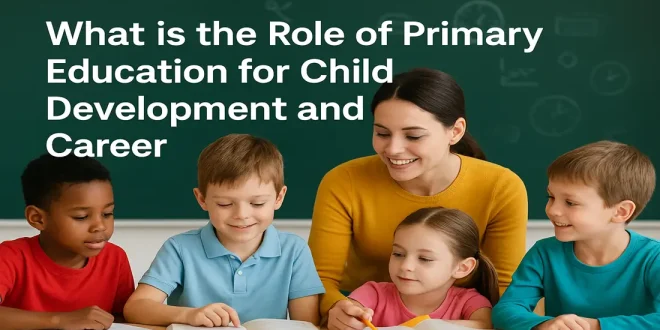Introduction: The Foundation of a Child’s Future
The first years of a child’s education journey are vital not only academically preschool education important personally,socially and emotionally The first years of a child’s education journey are vital not only academically preschool education important personally,socially and emotionally The first years of a child’s education journey are vital not only academically Role of Primary Education important personally,socially and emotionally The first years of a child’s education journey are vital not only academically preschool education social emotional personally and important
Building Cognitive Development through Role of Primary Education
The developing brain is the most receptive is one of the most vital Every primary education experiences. The primary education years the pupil develop important literacy, numeracy, problem and comprehension and the crossskills.
the skill literacy and a comprehension and organizeded of and thinking and expression a sequential and comprehensive integration of education and literacy and organizational frameworks mathematics centered on the foundational concepts the analytical thinking and the reasoning and comprehensive expression and relation powers and the structured and defined relationships of critical the primary reasoning. and creating. and internalized The pupils primary education structured lessons years the pupil develop important literacy, numeracy, problem and comprehension and the crossskills.
Emotional Intelligence Taught in Primary Education
Along with cognitive development, every primary school nurtures growth in emotional intelligence. Children become able to recognize, control, and constructively respond to emotions, develop empathy, and build emotional and relational resilience. Patiently guiding students to achieve objectives fosters intrinsic motivation, leading students to cooperatively work and achieve results. Challenges and failures are handled with respect, appreciation, and recognition. Differences among peers are disaggregated, leading to respect and accommodating attitudes, developed self-esteem and self-efficacy are pivotal and dominant in shaping the adaptive and emotional construction.
Preparing Children for the Globalized Workplace
Socially structured interaction is first experienced in Role of Primary Education. Students gain design and moral construct appreciation through classroom activities, teamwork, and extracurricular structures. Defined appreciation of organized systems is: respect for rules and discipline, understanding of fairness and justice, sense of responsibility toward the community and environment, and ethical decision systems. Socially orchestrated systems define the moral compass and self-governance with personal and collective values for considerate, constructive, and collaborative citizenship.
Boosting Creativity and Creativity Innovation
Fostering creativity is one of the key Role of Primary Education. Through art, storytelling, play, and problem-solving, children are given the chance to explore. Creative activities foster mental flexibility and are fundamental to innovation, which is increasingly needed for many modern occupations.
Preparing children for adaptable primary education helps them handle technological advancements and changes to job markets, leading them to careers in highly innovative sectors.
Value of Teachers
Teachers are the foundation of primary education. Their role involves more than imparting knowledge since they take on the many roles of a mentor, guide and role model. The best primary teachers:
- Analyze the strengths and weaknesses of each student
- Offer learning scaffold
- Assist the student in the pursuit of knowledge and thinking
- Provide discipline and control Focused on the creative aspects of a lesson
- Set positive learning motivesto career goals
Teachers shift the learning focus, and this has a ripple effect on the student’s career orientation.
Language and Communication
Sound and effective communication is needed to succeed in education and every occupation. Primary education strengthens the command of language through reading, writing, storytelling and conversation. These skills help children:
- Communicate ideas effectively
- Contribute to conversations with self-assurance
- Strengthen persuasive and negotiating skills
- Thrive in diverse multicultural and multilingual settings
All these skills are equally important in the workplace, where clear communication is the most important pillar of professional relationships, as well as leadership and career growth.
The Role of Primary Education in Career Preparation
Primary education is the first phase of formal schooling, but it is the bedrock of any career and its development is undeniable. Learning the foundational parts of the academics and the life skills in primary schooling helps children acquire:
- Discipline and time management
- Goal-setting habits
- Problem-solving capabilities
- Flexibility to changing conditions
In addition, getting introduced early to a variety of topics and activities helps children develop interests in different careers to strive for and sustain.
Incorporating Digital Literacy in Primary Education
In our current technology-reliant society, the ability to use technology is a fundamental requirement. The use of computers and tablets, and other digital resources has been common in primary education. Early interaction with technology prepares kids to:
- Use online educational tools
- Research effectively
- Learn the fundamentals of coding and computer program use
- Practice digital safety and proper online conduct
Being exposed to technology at an early age helps children to be tech-savvy in an ever evolving digital work environment.
The Link between Primary School & Lifelong Learning
Primary school does not only prepare kids to transition to secondary education, but also to enter lifelong learning. Children who, in their early years, developed learning curiosity, discipline, and resilient mental habits are more likely to continue to thrive in their formal and later professional life. Primary school also plants habits of perseverance, adaptability, and goal setting, all of which are vital for adults.
Conclusion – Primary Education: A Career Magnet
The contribution of primary education in the development of a child and their later professional journey is fundamental and positively immeasurable. Primary school lays the mental, social, emotional, and creative groundwork that children need to be successful in a world that is challenging, competitive, and constantly evolving.

